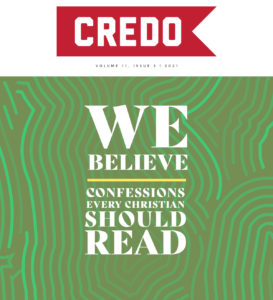
On Catholic Baptists: The London Baptist Confession of Faith
The latest issue of C redo Magazine focuses on Confessions every Christian should read. The following is one of the issue’s featured articles by Geoff Change. Dr. Chang serves as Assistant Professor of Church History and Historical Theology and the Curator of the Spurgeon Library at Midwestern Baptist Theological Seminary.
redo Magazine focuses on Confessions every Christian should read. The following is one of the issue’s featured articles by Geoff Change. Dr. Chang serves as Assistant Professor of Church History and Historical Theology and the Curator of the Spurgeon Library at Midwestern Baptist Theological Seminary.
Are creeds still useful today? For many churches, the statement of faith is like a piece of outdated furniture gathering dust in the corner. The language is archaic. The terms are confusing. Nobody remembers how it got there. And yet, for sentimental reasons, no one wants to get rid of it either. In our pragmatic age, it’s not always clear how useful these creeds are. After all, the cry of our day is unity. In the West, Christians are finding themselves more divided than ever over all kinds of issues.
Do we really need to emphasize our distinct beliefs to separate ourselves further from other Christians? Not only that, but we face a world full of urgent problems. Shouldn’t the church instead be concerned about evangelism? Global missions? Social justice? For many church leaders today, the rallying cry has become not a creed but a cause.
The Usefulness of Creeds
As we ponder the usefulness of creeds, a look back at one of the earliest Baptist confessions provides some guidance. British Baptists in the second part of the 17th century were facing some serious challenges. With the 1660 restoration of Charles II, the Episcopalians regained control of the Church of England and quickly passed legislation to suppress all religious dissent. Baptists, who had previously enjoyed a measure of toleration under Cromwell, now found themselves once again under persecution. Before long, this persecution spread to the general populace. Baptists were once again looked on with suspicion as rumors and charges of anarchy, heresy, and schism spread. How did Baptists respond to all this?Amid all the pressing needs and challenges of their day, Baptists found unity and strength for their mission in their creed. Click To Tweet
In 1677, Particular Baptist churches in England and Wales came together to approve a new confession. Amid all the pressing needs and challenges of their day, Baptists found unity and strength for their mission in their creed. A second edition would be published in 1688, and today, this confession is widely known as the Second London Confession or the 1689 Baptist Confession of Faith. Since its publication, churches throughout the world have used or drawn from it as their confessional statement. Based on the Westminster Confession, these 32 articles provide an eloquent summary of historically Christian, Protestant, and Baptist convictions.
One aspect that is sometimes overlooked is the preface to the 1677 Confession. Written “to the judicious and impartial reader,” this preface outlines the motives and purpose behind this confession. For those unsure about the reason for a statement of faith, here are the three reasons these Baptists crafted a new confession in 1677. The first reason is covered below, and the other two will be featured in a post next week.
Unity
The first Particular Baptist churches in London had already approved a confession of faith in 1644. This earlier confession helped clarify the theological convictions of this fledgling group, clearing them from charges of “heterodoxies and fundamental errors.” By 1677, however, Particular Baptists had grown significantly, and churches were having trouble finding copies of the original confession. Rather than reprinting the 1644 Confession, Baptists saw an opportunity to approve a new one. Why is that?The preface to the 1677 Confession of Faith reminds us that creeds serve to unite local churches together. Click To Tweet
In 1646, the Westminster Assembly approved the Westminster Confession of Faith. This confession would become the authoritative creed of the English Presbyterians and would also be adopted by the Church of Scotland. In 1658, the Congregationalists also adopted the Westminster Confession at the Savoy Conference, after revising some of the articles to reflect their view of the Church. As Baptists in 1677 considered the broader context of religious persecution, they saw an opportunity for a united front among dissenting churches. In the preface, the authors state,
And therefore we did conclude it necessary to express ourselves the more fully and distinctly, and also to fix on such a method as might be most comprehensive of those things which we designed to explain our sense and belief of; and finding no defect in this regard in that fixed on by the Assembly, and after them by those of the Congregational way, we did readily conclude it best to retain the same order in our present Confession.
Rather than trying to come up with new language for their beliefs, these Baptists (like the Congregationalists) chose not only to express similar theological ideas but also “for the most part without any variation of the terms… making use of the very same words with them both, in those articles (which are very many) wherein our faith and doctrine is the same as theirs.” They did this to declare “before God, angels, and men, our hearty agreement with them in that wholesome protestant doctrine.” Their priority was not to set themselves apart but to show themselves as belonging to the Protestant Reformed tradition.
The preface to the 1677 Confession of Faith reminds us that creeds serve to unite local churches together. This is true not only for churches inside a particular association. It is also true for churches across different denominations that share the same Protestant heritage. Though expressions may vary, Protestant churches still share similar theological convictions and language about the most vital aspects of their faith. Despite our differences, this fundamental unity is made clear through a church’s confession of faith.
Sometimes churches may be tempted to modernize their statements of faith by doing a complete re-write, using brand new theological expressions, images, and even ideas. While it’s good to have a creed that a congregation can understand and appreciate, an overly creative one has the danger of isolating a church from other churches. The 1677 Confession reminds us that unity is to be prioritized over creativity.
Distinction
Though these Baptists were eager to show their unity with their Presbyterian and Congregationalist brethren, they were also not ashamed to clarify their distinctives.A confession of faith shapes the discipleship of a church, humbling them before God, teaching them to love and submit to each other, strengthening them in the fight against sin, and promoting their ministry in the world. Click To Tweet” username=”credomagazine”]
In those things wherein we differ from others, we have expressed ourselves with all candour and plainness… yet we hope we have also observed those rules of modesty and humility as will render our freedom in this respect inoffensive, even to those whose sentiments are different from ours.
Note their two priorities in expressing their distinctives. First, they sought to be honest, declaring their views plainly and clearly. They were not ashamed of their position and therefore, did not need to hide their convictions. But second, they also sought to express their view with modesty and humility. Their goal was not to bind other people’s consciences or to dominate other’s opinions. Instead, they sought the freedom to have a place at the table alongside those with different sentiments.
Of course, the unique contribution that these Baptists brought was their view of baptism. Speaking of the proper subjects of baptism, they confessed, “Those who do actually profess repentance towards God, faith in, and obedience, to our Lord Jesus, are the only proper subjects of this ordinance.” And on the mode of baptism, they confessed, “Immersion, or dipping of the person in water, is necessary to the due administration of this ordinance.”

